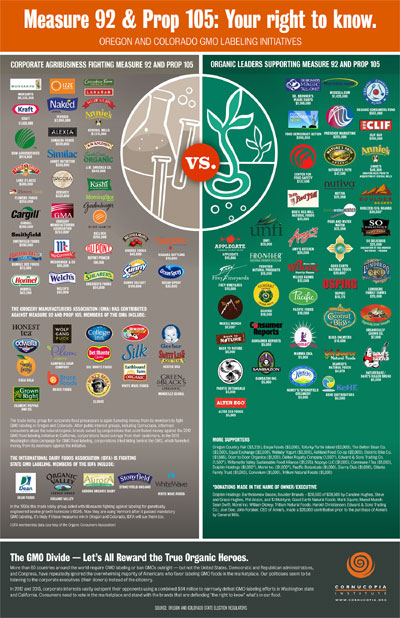Update October 27: Opponents to GMO labels have raised
$16.5 million to defeat Oregon’s Measure 92 and $14.3 million against Colorado’s Proposition 105.
Monsanto is the largest donor to both campaigns totaling about $8.8 million. While Dow has spent only $668,000, DuPont Pioneer just dumped a whopping $3 million into the Colorado NO on Prop 105 war chest.
The money is working: less than a month ago, polling showed GMO labeling in Oregon up by 32%, but now it’s just 5% ahead.
If you care about this issue, volunteer to make phone calls – it can make all the difference. They also desperately need donations.
Volunteer in Oregon or Colorado.
Dr. Bronner’s is again showing strong leadership on labeling. Besides being the biggest donor on the Yes side, it’s running a full-page advertorial in The New Yorker, Scientific American, Harpers, Harvard, The Nation, Mother Jones, The Progressive, and Thrive magazines to refute one of Monsanto’s favorite myths – that GMO crops lead to a reduction in pesticide use. The advertorial is called, "Herbicide and Insecticide Use on GMO Crops Skyrocketing while Pro-GMO Media Runs Interference."
—
For those of you who live in Oregon or Colorado, there are important referendums in November’s elections – getting GMO labels on food.
This is another reason to help get out the vote in those states besides key, extremely tight Congressional races there.
Referendums in California and Washington State were narrowly defeated after industry interests spent an eye-popping $50 million to confuse voters on the issue. Deceptive ads scared people into thinking food prices would rise if GMO label are required.
Now they are hard at work again. Most of the opposition comes from the double wammy of big biotech – Monsanto, DuPont, Dow and other agribusinesses that sell GMO seeds and herbicides – and big food, represented by their national lobbying group, Grocery Manufacturers Association. Many of them own organic brands.
Monsanto, of course, is the single biggest spender at $6.3 million. Other big donors for the "No" vote are Pepsi at $2 million and General Mills (which recently bought Annie’s), exceeding $1.5 million. Just this week, Kellogg dropped $250,000.
They even spent $1 million to keep two counties in Oregon from banning cultivation of GMO crops this year. But it passed!
They, along with the dairy industry, are suing Vermont for passing GMO labeling legislation, as they push for a national law that forbids states from doing so.
Businesses leading the fight for GMO labels are also back: Dr. Bronner’s – with $715,500 in donations – Bob’s Red Mill and Nature’s Path, along with non-profits Organic Consumer’s Fund and Food Democracy Action.
As usual, supporters of GMO labels can’t come close to big business spending. In Oregon, supporters have raised $2.96 million compared to opponents’ $5.41 million, and in Colorado, the difference is ludicrous – $9.7 million versus $320,000.
"We doubt if loyal customers of Naked Juice (PepsiCo), Dagoba chocolate (Hershey’s) RW Knutson or Santa Cruz juices (Smuckers) realize that their corporate parents are taking the profits from their patronage and stabbing them in the back by investing to defeat GMO labeling on food packages," notes Mark Kastel, co-director of The Cornucopia Institute.
Click here to see this infographic bigger.

Read our article, Why ‘Big Food’ is Afraid of GMO Labeling, Paying Plenty to Stop It.
To make calls to get out the vote in Colorado:

“In general, the committee finds that genetic-engineering technology has produced substantial net environmental and economic benefits to U.S. farmers compared with non-GE crops in conventional agriculture.” US National Academy of Science 2010 report-Impact of GE crops on farm Sustainability in the US.
“It is vital that sustainable agricultural
production and food security harnesses the potential of biotechnology in all its facets.”
European National Academies of Science Advisory Council 2013 report-Planting the Future